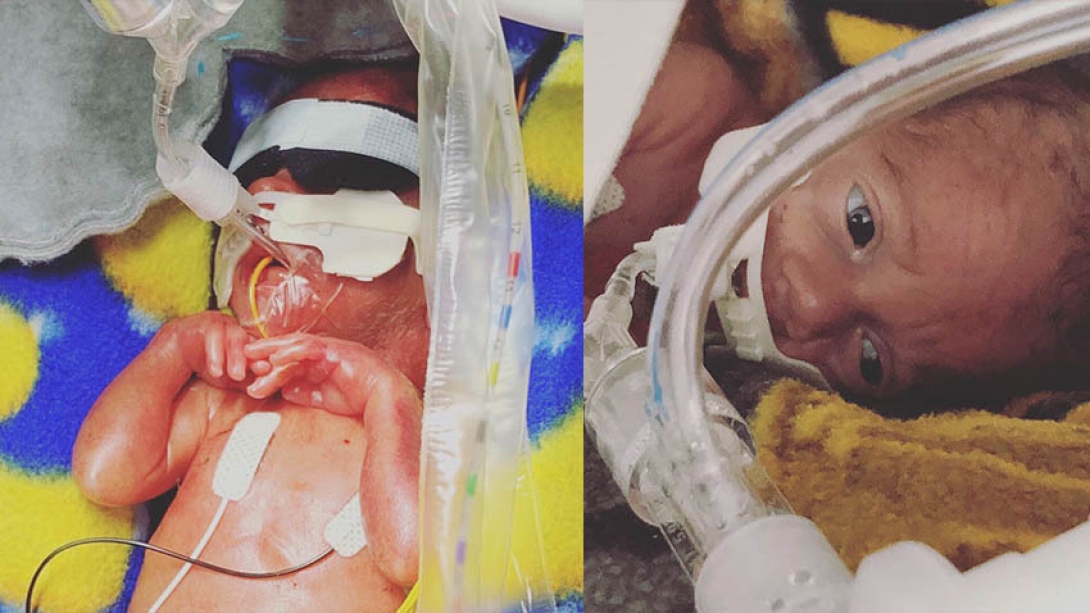A unique partnership helped one East Lansing family when their newborn needed multiple surgeries to save his life.
9:34 AM
Author |

From birth, Xander Laskos had the best of both worlds when it came to his care: Michigan Medicine C.S. Mott Children's Hospital and Sparrow Health System.
Born prematurely, just shy of 24 weeks at Sparrow Hospital in Lansing, Xander's early birth was brought on by a fast-moving infection his mother, Meghan, had which caused a placental abruption, a condition which causes the placenta to tear away from the uterus.
Meghan and her husband, Chris, who live in East Lansing near Sparrow hospital, were finally able to hold their son for the first time on Aug. 30, 2019; this was six days after Meghan underwent an emergency C-section.
Because of Xander's prematurity, his care team was frequently monitoring his lungs for signs of chronic lung disease, a common occurrence with premature babies. His lung x-rays led the team to worry about his abdomen, so they X-rayed his stomach. They discovered abnormal air, indicating he had a hole in his intestines, a condition known as pneumoperitoneum. This meant stool was circulating where it shouldn't be, causing him to get sick.
"We thought we were going to get to hold him in a happy moment and we ended up holding him in sort of a very scary moment, because he was about to go into surgery," Meghan says.
That's when they met C.S. Mott Children's Hospital pediatric surgeon Erin Perrone, M.D., who was on call at Sparrow that day as part of a team of Mott specialists who work alongside Sparrow's pediatric providers every day.

Sparrow Health System, one of the clinical centers for Michigan State University, and C.S. Mott Children's Hospital, which is part of Michigan Medicine at the University of Michigan, recently partnered to expand access to advanced pediatric specialty care for families in the Mid-Michigan region through Sparrow Children's Center in Lansing. In addition to the pediatric surgeons from Michigan Medicine, pediatric cardiologists, gastroenterologists, ophthalmologists, oncologists, critical care physicians and genetic counselors from Mott also collaborate to help families at Sparrow to provide care for pediatric patients through this joint venture.
Perrone, only one of a small number of pediatric surgeons in the state of Michigan, performed a bedside procedure on 1 pound, 9-ounce Xander, inserting a small drain in the right side of his lower abdomen to remove the air and fluid.
"Because of his extreme prematurity and very small size, doing a formal surgery, where you open the abdomen to find and repair the hole, is just too dangerous," Perrone says.
Using a safety net
Xander's recovery went well for three months after that initial drain. The hole was sealed and he was able to slowly start taking feeds after a few weeks. He gained weight and seemed to be thriving, with Perrone and the rest of the Michigan Medicine surgery team checking in on him regularly.
But in late November, he developed pneumoperitoneum again which meant he had another hole in his intestine. The root of the trouble was necrotizing enterocolitis, a disease that uniquely impacts the intestines in premature babies. Bacteria develops in the walls of the immature intestines, causing inflammation and, in the most severe form, leads to a hole that leaks stool into the abdomen.
Because he had grown much bigger since his last operation, the care team decided he needed a formal operation on his bowels instead of the drain. Because of the potential for this to be a complicated surgery, his medical team rushed him to the C.S. Mott Children's Hospital so they could repair the hole.
"We, of course, want to take care of the things that we can take care of at Sparrow. If appropriate and safe, we think it's best to deliver care locally for families. But when it gets complicated, which sometimes occurs like it did in Xander's case, we have a safety net," Perrone says. "C.S. Mott Children's Hospital is a parachute for the more complex cases."
Perrone's colleague Ronald Hirschl, M.D., completed Xander's exploratory laparotomy, where he removed a piece of his intestines where the hole was. Hirschl, who was familiar with the case because of Perrone's updates, left Xander's incision open (which is common in these operations when infants are critically sick) and then took him back to surgery to connect his intestines two days later.
The continuity of care
Knowing that Meghan and Chris had to drive nearly an hour to see Xander and get a babysitter each time for their two daughters, the team at Mott understood that returning Xander to Sparrow was best for the family. He was transferred to Sparrow six days after his first surgery, which is quicker than a normal transfer after such major surgery. However, Perrone was at Sparrow to check on him after he arrived; it was the same surgical care team at both hospitals which allowed for the earlier transfer.
"The continuity of care is important," for families and the patient, Perrone says.
What sticks out in Meghan's mind is the seamless process of the transfer between hospital systems.
"The nice thing about the two hospitals working together is they know each other, they trust each other and communicate back and forth," removing the burden of worry that something would fall through the cracks. "Everybody knew exactly what had happened."
While at Mott, Meghan was able to pump her breast milk and Mott put it in a milk bank to freeze. When Xander returned to Sparrow, they sent him with a cooler full of mom's breast milk.
"The experience was so smooth," she says. "They took care of everything, even my breast milk."
But most of all, they took care of Xander, who left Sparrow Jan. 20 and now at 14 months, is 20 pounds and a champion eater.
It's too soon to tell if Xander will grow to be a Spartan or Wolverine fan for now, but the family does know they'll always feel grateful for how both institutions came together and saved their son.
"Between the two hospitals, he received the best care that we could have ever hoped for," mom Meghan says.

Explore a variety of health care news & stories by visiting the Health Lab home page for more articles.

Department of Communication at Michigan Medicine
Want top health & research news weekly? Sign up for Health Lab’s newsletters today!





